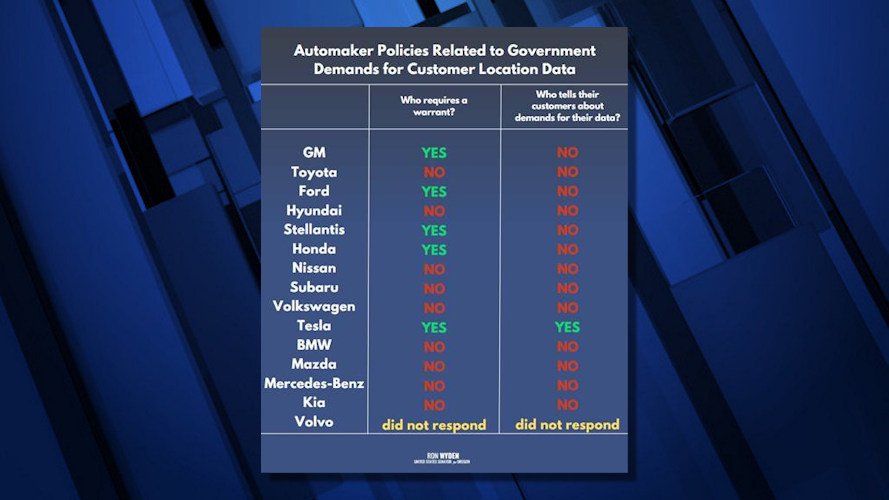Wyden, Markey say automakers provide detailed location info to police without a warrant, rarely tell car owners

WASHINGTON (KTVZ) – Sens. Ron Wyden, D-Ore., and Edward Markey, D-Mass., requested the Federal Trade Commission investigate major automakers for breaking a pledge to protect their customers’ location data, in a letter to Chair Lina Khan sent Tuesday.
The lawmakers say the automakers had deceptively pledged that they would insist on warrants or other court orders before turning over location data from their customers’ connected automobiles to law enforcement agencies.
The letter comes in response to an inquiry by Sen. Wyden’s office, which asked the association representing automakers how their members respond to law enforcement requests for location information collected from internet-connected cars and trucks. He found that only five — GM, Ford, Honda, Stellantis and Tesla — require a warrant to provide location data to law-enforcement. And only Tesla notifies auto owners about government demands.
“Automakers have not only kept consumers in the dark regarding their actual practices, but multiple companies misled consumers for over a decade by failing to honor the industry’s own voluntary privacy principles. To that end, we urge the FTC to investigate these auto manufacturers’ deceptive claims as well as their harmful data retention practices,” Wyden and Markey wrote.
Toyota, Nissan, Subaru, Volkswagen, BMW, Mazda, Mercedes-Benz and Kia all confirmed that they will disclose location data to U.S. government agencies in response to subpoenas, which do not require a judge’s approval. Volkswagen indicated that it will require a warrant for more than seven days of location data, but will disclose six days or less in response to a subpoena. Volvo, which is owned by Geely, a Chinese company, did not respond to the request.
These responses directly contradict a public pledge by the auto industry, that the companies signed onto, committing to require that “requests or demand from governmental entities for geolocation information, must be in the form of a warrant or court order,” except in emergency situations or with the owner’s consent.
Wyden and Markey warned that failing to protect Americans’ privacy could have dangerous consequences, particularly in the wake of the Supreme Court’s Dobbs decision, which allows states to criminalize abortion and places other reproductive health choices at risk of criminalization. Vehicle location data can reveal intimate details of a person’s life, including for those who seek care across state lines, attend protests, visit mental or behavioral health professionals or seek treatment for substance use disorder.
The full letter to the FTC is here.